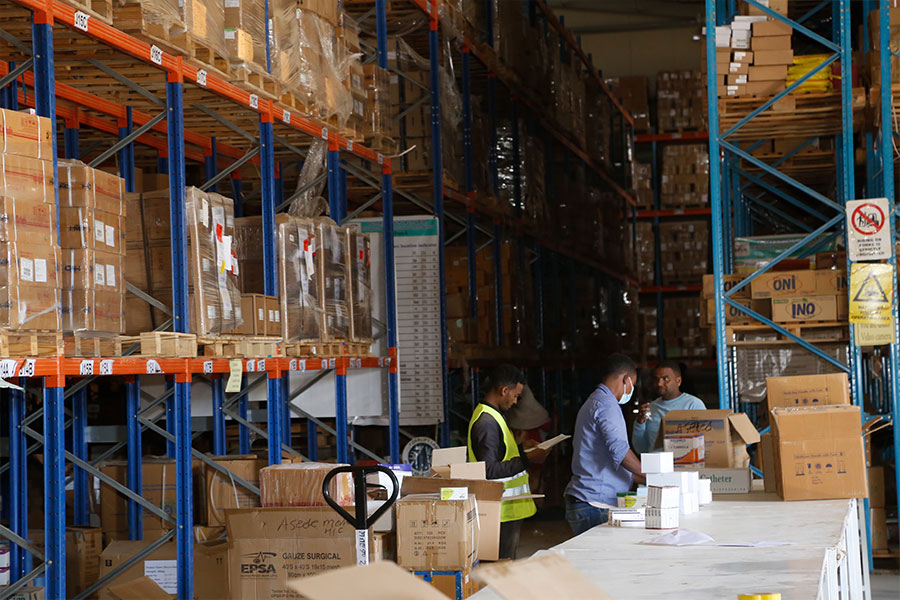
Radar | Jan 12,2019
The drug supply chain may soon see its most important overhaul in years as a proposed directive transfers full procurement authority for pharmaceutical supplies from the Public Procurement & Property Authority to the Ethiopian Pharmaceutical Supply Service (EPSS). According to officials familiar with the directive, it is designed to give the EPSS a broader mandate and accelerate critical decision-making.
The Ministry of Finance (MoF) proposed the latest bureaucratic manoeuvre while frustrations build up with long-standing processes and delays that have left hospitals and health centres chronically understocked.
For years, the existing arrangement has been blamed for persistent medicine shortages. According to Awol Jemal, director of quality control at the EPSS, the convoluted system of oversight, coupled with overlapping layers of approval, has made it difficult to respond promptly to urgent supply demands. If passed, he says the draft directive will streamline the process and help ensure more reliable access to essential drugs.
“The current arrangement delays our decision-making and disrupts the supply chain,” he said.
Two years ago, the EPSS distributed medical and pharmaceutical supplies worth 51 billion Br to over 420 hospitals, 4,100 health centres, and 18,500 health posts nationwide. Awol hopes that the EPSS will gain the authority to sign off on procurement deals without resorting to slow-moving procedures that frequently prove incompatible with a sector as time-sensitive as medicine distribution.
The draft directive includes a notable shift designed to help local bidders.
Domestic manufacturers have long complained about a requirement that forced them to quote their prices in the local currency, even as foreign competitors offered prices in foreign exchange. Due to Ethiopia’s volatile exchange rates and import-heavy market conditions, many suppliers felt this disadvantaged them. The proposed bill would permit domestic manufacturers to quote in foreign currency, potentially giving them a "fairer footing" and allowing them to hedge against currency fluctuations. Industry operators consider the measure a recognition of the domestic sector’s role in meeting the growing pharmaceutical needs.
Domestic manufacturers are upbeat about the proposed changes. Among them is Daniel Waktole, president of the Ethiopian Pharmaceuticals & Medical Supplies Manufacturers Association (EPMSMA) and a major shareholder of Kilitch Estro Biotech Plc, a company that recently secured a 522 million Br contract with the EPSS.
“If approved, it will boost local pharmaceutical production and competitiveness,” he told Fortune.
Domestically produced medicine currently accounts for only about 15pc of total supplies, with imports filling the rest. Officials set a target to increase domestic manufacturers’ share of EPSS procurements from eight percent to 40pc this year and to 60pc within a decade. Financial incentives are on the table, including a price advantage of up to 25pc for local suppliers and an additional preference for small and micro enterprises.
Still, many domestic suppliers have struggled to meet expectations. They delivered only 23.8pc of their contractual obligations in recent years. Industry insiders blame capacity limitations, raw material shortages, and low spending on research and development. Much of the production remains limited to generic drugs, such as antibiotics and essential pills. The new directive also pushes the bar higher for foreign bidders, raising the revenue threshold from 200 million Br to two billion Birr to attract more established international suppliers and stunt the surge in substandard and counterfeit medicines.
Health officials say medicine shortages have led to acute crises on the ground.
According to Zewditu Hospital’s Director, Teshome Hunde (MD), the facility is allotted 100 million Br annually for drug procurement, yet it covers only about half its needs. Broader governance issues compound such supply gaps.
Health economist Getasew Amare concurred. He observed lingering problems throughout the value chain, citing capacity shortfalls and reduced support from international organisations like the World Health Organisation (WHO), which used to shoulder about 30pc of the country's medicine supplies. According to Getasew, the decline in external funding leaves the federal government under heightened pressure, making reforms such as the proposed EPSS procurement overhaul even more critical in ensuring that essential drugs reach patients on time.
The new directive establishes a procurement board within the EPSS responsible for assessing and approving procurements. The board will consist of a three-member committee with a three-year tenure.
Procurement Authority officials are also optimistic.
Gebeyaw Yitayew, head of the Authority's procurement directorate, believes the new directive will address supply chain bottlenecks, particularly in importing raw materials critical for domestic production.
PUBLISHED ON
Jan 03,2025 [ VOL
25 , NO
1288]

Radar | Jan 12,2019

Fortune News | Jul 30,2022

Fortune News | May 25,2019

Radar | Jan 16,2024

Radar | Sep 10,2022

Fortune News | Sep 03,2022

Radar | Jun 22,2024

Fortune News | Jun 04,2022

Viewpoints | Mar 13,2021

Fortune News | Apr 29,2023

Dec 22 , 2024 . By TIZITA SHEWAFERAW
Charged with transforming colossal state-owned enterprises into modern and competitiv...

Aug 18 , 2024 . By AKSAH ITALO
Although predictable Yonas Zerihun's job in the ride-hailing service is not immune to...

Jul 28 , 2024 . By TIZITA SHEWAFERAW
Unhabitual, perhaps too many, Samuel Gebreyohannes, 38, used to occasionally enjoy a couple of beers at breakfast. However, he recently swit...

Jul 13 , 2024 . By AKSAH ITALO
Investors who rely on tractors, trucks, and field vehicles for commuting, transporting commodities, and f...

Sep 13 , 2025
At its launch in Nairobi two years ago, the Africa Climate Summit was billed as the f...

Sep 6 , 2025
The dawn of a new year is more than a simple turning of the calendar. It is a moment...

Aug 30 , 2025
For Germans, Otto von Bismarck is first remembered as the architect of a unified nati...

Aug 23 , 2025
Banks have a new obsession. After decades chasing deposits and, more recently, digita...